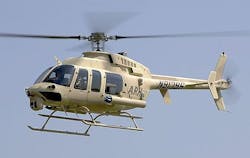Army sends out feelers to industry for companies able to repair Rockwell Collins AN/ARN-153 navigation avionics
ABERDEEN PROVING GROUND, Md., 7 March 2013. U.S. Army avionics experts are trying to find military avionics companies with the expertise and experience to repair components in a tactical airborne navigation system (TACAN) for high-performance helicopters and fixed-wing aircraft.
Officials of the Army Communications-Electronics Command (CECOM) Life Cycle Management Center at Aberdeen Proving Ground, Md., have issued a source-sought notice (MARKET-SURVEY-5404-1) looking for companies able to repair the Rockwell Collins AN/ARN-153 Advanced Digital TACAN.
The AN/ARN-153 avionics system, which Rockwell Collins calls the TCN-500, is an airborne receiver-transmitter (RT) component of the Tactical Airborne Navigation (TACAN) system. It measures the slant-range distance and relative bearing to a selected ground station or an airborne beacon and computes velocity and time-to-go to that station.
The TCN-500 has been installed in cargo, fighter, bomber, trainer, and rotary-wing aircraft for the U.S. military services and for militaries around the world, Rockwell Collins officials say.
Companies capable of maintaining AN/ARN-153 components should respond in writing no later than 28 March 2013 to Product Realization Directorate, ATTN: RDER-PRD-AB (McFadden), 6007 Combat Drive, F3-140-64, Aberdeen Proving Ground, MD 21005.
Responses must include documentation such as repair and maintenance records, copy of relevant maintenance orders, or a statement from a listed source that the supplier can in fact maintain these items and return them to the Army in operating order. No telephone responses will be accepted.
The AN/ARN-153(V) supports four modes of operation: receive mode; transmit/receive mode; air-to-air receive mode; and air-to-air transmit-receive mode, according to Rockwell Collins.
Digital interfaces include dual MIL-STD-1553B buses and ARINC 429, 568, or 582 buses providing range, bearing, frequency, velocity, and time-to-station.
For questions or concerns contact the Army's John McFadden by phone at 443-395-1241, or by email at [email protected].
More information is online at https://www.fbo.gov/notices/03271c5eed987b2cacca5ba68fab0b1e.
About the Author
John Keller
Editor-in-Chief
John Keller is the Editor-in-Chief, Military & Aerospace Electronics Magazine--provides extensive coverage and analysis of enabling electronics and optoelectronic technologies in military, space and commercial aviation applications. John has been a member of the Military & Aerospace Electronics staff since 1989 and chief editor since 1995.

